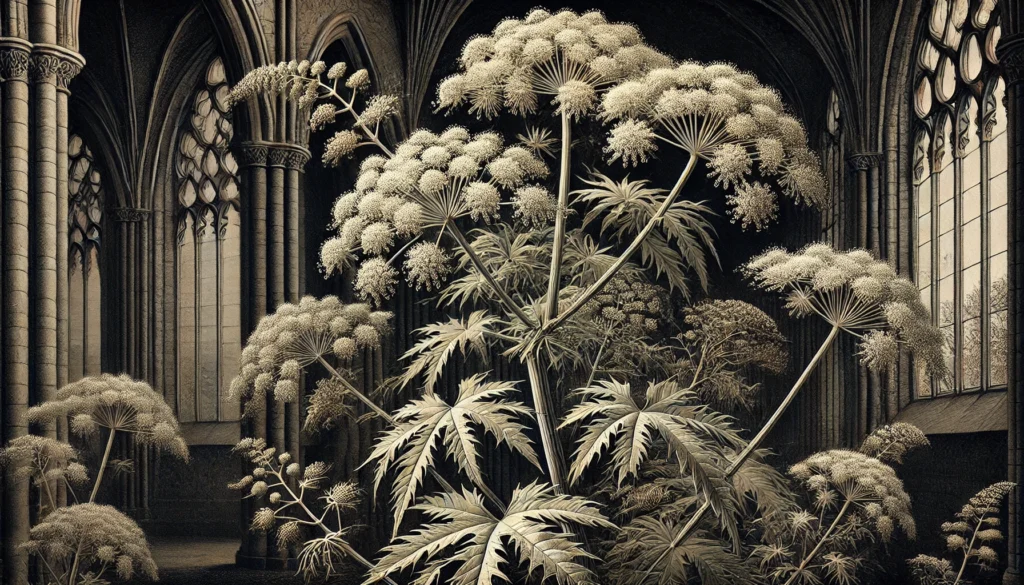

Home » Cat Plants » The Dangers of the Poison Hemlock Plant to Cats

Poison hemlock (Conium maculatum) is a highly toxic plant that poses a serious threat to cats. While not an allergen, poison hemlock contains dangerous compounds called coniine and γ-coniceine that can rapidly affect a cat’s nervous system if ingested.
This poisonous plant is commonly found in fields, along roadsides, and in disturbed areas throughout North America and Europe.
Ingestion may cause mild gastrointestinal upset, but is generally not life-threatening.
Ingestion can result in mild symptoms like vomiting, diarrhea, or drooling. Rarely fatal but may require veterinary care.
Eating these plants can lead to more pronounced symptoms like abdominal pain, lethargy, or difficulty breathing. Veterinary intervention may be necessary.
Ingesting even small amounts can cause severe symptoms like organ damage, seizures, or cardiac failure without rapid treatment.
All parts of these plants are extremely poisonous to cats and can quickly lead to death, even with immediate veterinary care.
** Please note: Please note that toxicity level can vary based on the amount ingested and the specific cat. It's always best to keep these plants completely inaccessible to cats and seek immediate veterinary care or call the poison hotline if you suspect your cat has ingested any part of a toxic plant.
If a cat ingests any part of the poison hemlock plant, they may experience a range of concerning symptoms. Watch closely for signs such as:
These symptoms can escalate quickly and may lead to respiratory failure and death if left untreated.
If you suspect your cat has been exposed to poison hemlock, seek immediate veterinary care. Your vet will likely perform a thorough physical exam and may recommend:
Treatment will focus on decontamination (inducing vomiting or administering activated charcoal), supportive care to manage symptoms, and monitoring for complications. With prompt treatment, many cats can recover from hemlock poisoning.

A: Yes, Poison Hemlock is highly toxic to cats. It contains alkaloids that can cause symptoms like vomiting, tremors, and even paralysis or death if ingested.
A: If a cat eats Poison Hemlock, it may show signs of poisoning such as vomiting, drooling, and seizures. Immediate veterinary care is crucial to prevent fatal outcomes.
A: Yes, all parts of the Poison Hemlock plant are toxic to cats. This includes the leaves, stems, and seeds, which contain toxic compounds harmful to pets.
A: Even small amounts of Poison Hemlock can be extremely dangerous to cats. Ingesting any part of the plant can lead to severe poisoning, so it’s essential to keep your cat away from it.
A: Yes, Poison Hemlock poisoning can be fatal in cats if not treated promptly. The plant’s toxic alkaloids can cause respiratory failure and death without immediate veterinary intervention.
A: If your cat ingests Poison Hemlock, contact your veterinarian or an emergency clinic immediately. Early intervention is crucial to minimize the toxic effects and save your cat’s life.
Poison hemlock has a long and notorious history. In ancient Greece, it was used to execute prisoners, most famously the philosopher Socrates in 399 BC. Throughout the centuries, poison hemlock has been employed as a medicine, cosmetic, and poison.
Despite its toxicity, poison hemlock was once used to treat ailments like bronchitis, asthma, and tumors. Its use as a sedative and antispasmodic continued into the early 20th century before safer alternatives were developed.
Today, poison hemlock is considered an invasive weed in many areas. Its similarity to other plants like parsley, fennel, and Queen Anne’s lace sometimes leads to accidental poisonings in humans and animals.
Please note: The information shared in this post is for informational purposes only and should not be considered as veterinary medical advice.
🐾 A hilarious or heart-melting cat video
🐾 Our latest paws-on review of a cool cat toy